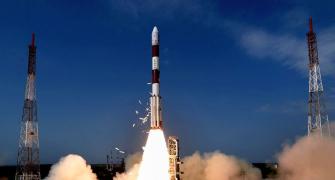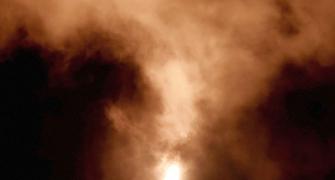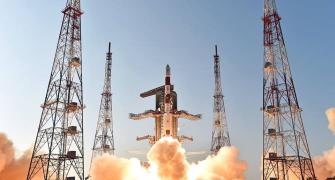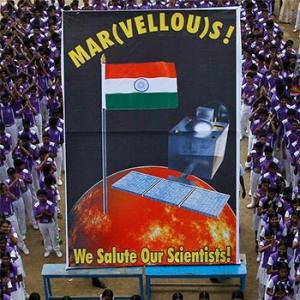India on Friday reaffirmed its space prowess and commercial launch capabilities as it successfully launched its 100th satellite along with 30 other spacecraft including weather observation Cartosat 2 series onboard the Polar rocket from Sriharikota.

This was Polar Satellite Launch Vehicle’s longest-ever mission.
With the successful launch, including 28 satellites from foreign countries, by the PSLV, Indian Space Research Organisation put behind a rare failure it encountered four months ago.
The ISRO had suffered a setback after the failure of the earlier PSLV-C39 mission in August last year.
The previous mission to launch backup navigation satellite IRNSS-1H on board PSLV-C39 had failed after the heat shield did not separate in the final leg of the launch sequence, with the satellite getting stuck in the fourth stage of the rocket.
Prime Minister Narendra Modi hailed ISRO scientists for the successful PSLV C-40 mission.
“The launch of the 100th satellite by @isro signifies both its glorious achievements, and also the bright future of India’s space programme,” he said a tweet.
A visibly relieved ISRO Chairman A S Kiran Kumar, on his final mission as the chief of the space agency, said he was happy to provide Cartosat 2 Series as a New Year gift for the country.
“ISRO is starting 2018 with the successful launch... All satellites have been released. So far Cartosat performance is satisfactory,” he said at the mission control room.

He said the previous launch faced a heat shield problem and an ISRO committee has addressed it and taken steps to ensure the vehicle was ‘robust’.
Friday’s mission marked a milestone in ISRO’s annals with a micro satellite, among the three Indian spacecraft launched, becoming the 100th to roll out through ISRO Satellite Centre Complex.
Besides ISRO’s communication, weather observation, navigation and experimental spacecraft, the 100 satellites included nano and micro spacecraft made by educational institutions in the country, Kumar, who is retiring later this month, said.
“Basically... the 100 satellites covers all student satellites also that have been put (by ISRO),” he told reporters at the post-launch briefing.
Earlier, in a precise launch, PSLV-C40 lifted off at 9.28 am at the end of the 28-hour countdown from the first launch pad of the Satish Dhawan Space Centre, about 110 km from Chennai, and soared into a cloudy sky.
After a perfect flight sequence, each of which was applauded by ISRO scientists, the four-stage rocket first injected the 710-kg Cartosat-2 Series Satellite for earth observation into 505-km polar sun synchronous orbit about 17 minutes after lift off.
India’s nano satellite and 28 payloads from six countries, including the United States and the United Kingdom, totally weighing 613 kg were then released into orbit one by one in a space of about seven minutes.
In a multi-orbit manoeuvre, micro satellite built by ISRO was placed in the orbit finally after the PSLV-C40 was brought down to 359.584 kilometre in polar Sun synchronous orbit by twice re-starting the fourth stage of the rocket, about 105 minutes after lift-off.
The fourth stage was finally shut off at about 2 hours 21 minutes, thus making the mission the longest ever by ISRO.
A similar kind of process was taken up during the launch of SCATSAT-1 on-board PSLV-C35 in September 2016 in which the fourth stage engine was restarted and later cut off for launching the satellite. This mission had lasted two hours and 15 minutes, ISRO scientists said.
Cartosat-2 Series is an advanced remote sensing satellite similar in configuration to earlier six spacecraft in the series and intended to augment data services to the users.
Its primary objective is to provide high resolution scene specific spot imageries that would help in urban and rural applications, coastal land use and regulation, road network monitoring, water distribution and geographical information system applications among others.
The 28 international customer satellites were launched as part of the commercial arrangements between ISRO and its commercial arm Antrix Corporation Ltd.
The co-passenger satellites include three micro and 25 nano-satellites from six countries -- Canada, Finland, France, Korea, the United Kingdom and US.
According to ISRO, the Cartosat-2 series satellite carries panchromatic and multi-spectral cameras operating in Time Delay Integration mode and is capable of delivering high resolution data.










